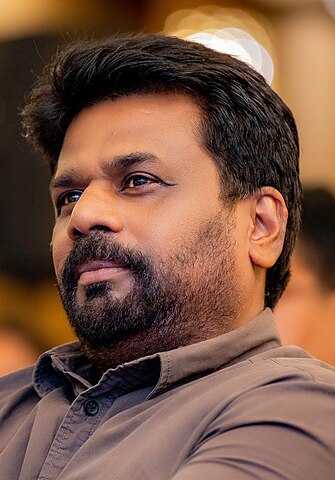More languages
More actions
Anura Kumara Dissanayake අනුර කුමාර දිසානායක அநுர குமார திசாநாயக்க | |
|---|---|
 | |
| Born | Dissanayaka Mudiyanselage Anura Kumara Dissanayake 24 November 1968 (age 55) Galewela, Ceylon |
| Political orientation | Marxism (claimed) Reformism Imperialism Anti-Tamil Racism |
| Political party | Janatha Vimukthi Peramuna |
Dissanayaka Mudiyanselage Anura Kumara Dissanayake, commonly known by his initials AKD, is a Sri Lankan politician who has served as president of the country from 23 September 2024.[1]
He is the leader of Janatha Vimukthi Peramuna, a de jure Leftist and Marxist party in Sri Lanka, and is the leader of National People's Power, a Left coalition. In reality both parties are Sinhala ethnonationalist parties with little connection to socialism.[1]
He supports Sinhala nationalist policies and rhetoric and has throughout his political life advocated against the Tamil people and their national liberation struggle. He has consistently opposed Tamil self-government, supported genocidal campaigns against the Tamils, and supports placing Buddhism as Sri Lanka's state religion.[1]
Early life and political involvement
Anura Kumara Dissanayake was born 24 November 1968 in central Sri Lanka to working parents.[2]
He first became politically while in school, opposing Tamil liberation in demonstrations against an agreement made with the Republic of India that would grant a degree of self rule to the ethnic minority.[2]
He joined the Socialist Students' Union, the student wing of the ostensibly leftist Janatha Vimukthi Peramuna party. In 1987 the JVP staged an armed insurrection against the government of Sri Lanka and Dissanayake went underground while most of the leadership of the JVP was killed or imprisoned.[2]
In 1993 he entered national politics in an effort to rebuild the party under Somawansa Amarasinghe. In 1994 the party won a seat in parliament, and in 1997 Dissanayake became national organizer of the Socialist Students' Union. He was added to the JVP Central Committee that year and joined the party politburo the next year.[2]
Mainstream political career
In 2000 Dissanayake was elected to parliament after JVP entered into an alliance with Chandrika Kumaratunga, then president of Sri Lanka. The alliance was created to oppose a propsed ceasefire agreement between then-Prime Minister Ranil Wickremesinghe and the Liberation Tigers of Tamil Eelam. He opposed the ceasefire agreement when it was signed in 2002.[2][1]
In 2004 he and his party campaigned explicitly against a ceasefire and formed an alliance with the Sri Lanka Freedom Party and that year became Minister of Agriculture, Lands, and Irrigation. The same year he opposed aid distribution efforts in majority Tamil regions after a tsunami devastated the area.[1]
In 2005 he and other JVP members resigned from the government due to the ongoing peace process and backed the anti-ceasefire candidate Mahinda Rajapaksa.[1]
In 2006 he was involved in the founding of the Joint Front to Protect the Nation, which was founded by the JVP in opposition to any ceasefire talks and in favor of military action.[1]
Dissanayake went on to support the genocidal 2009 campaign which destroyed the LTTE and resulted in up to 169,796 deaths of mostly civilians. During this time the JVP protested outside embassies and the United Nations office in Sri Lanka in protest of any efforts to investigate human rights abuses by Sri Lanka.[2][1]
He became leader of JVP when the left of the party broke away in 2014 and formed the National People's Power coalition in 2019, which included 21 groups. He subsequently moved to the right, stating that he supported a 'free market economy'.[2]
In 2019 he ran for president for the first time, losing to Gotabaya Rajapaksa, who was forced to flee the country amidst widespread protests two years later.[2]
2024 campaign
He ran again in 2024. He promised to dissolve parliament 'the very night' of victory, and promised to continue to grant Buddhism special status in Sri Lanka. His party also openly associated with Galagoda Aththe Gnanasara, leader of the Sinhala reactionary nationalist and fascist Bodu Bala Sena party. He toured the majority Tamil North-East of Sri Lanka during his campaign, and while there emphasized that he would not implement a proposed constitutional amendment which would grant greater powers to Tamils. He positioned the JVP as staunchly anti-federalist. He also promised during his campaign that no one accused of human rights violations and war crimes in the 2009 genocide would be punished.[1]
In addition to racism against Tamil people in Sri Lanka, the JVP has long run on hatred of people of Indian origin in Sri Lanka, with his party describing them as a 'fifth column'.[1]
Presidency
One of his first acts as president was the appointment of Sampath Thuyacontha as Secretary of Defense. Thuyacontha was responsible for many war crimes during the 2009 genocide, with him leading a helicopter gunship squadron responsible for 400 missions during that genocide. He claimed personal involvement in 60 missions during the later state of the fighting.[3]
References
- ↑ 1.0 1.1 1.2 1.3 1.4 1.5 1.6 1.7 1.8 1.9 "Anura Kumara Dissanayake declared Sri Lankan president" (2024-11-22). Tamil Guardian.
- ↑ 2.0 2.1 2.2 2.3 2.4 2.5 2.6 2.7 BHARATHA MALLAWARACHI (2024-11-23). "Who is Anura Kumara Dissanayake, Sri Lanka's new Marxist president?" ABC News.
- ↑ "Another accused Sri Lankan war criminal appointed as Defence Secretary" (2024-11-23). Tamil Guardian.
